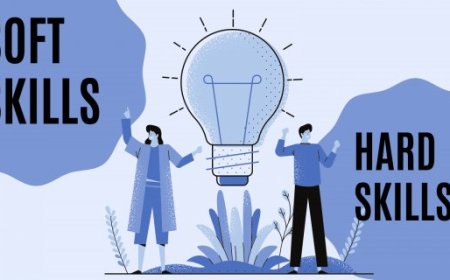Exploring Types of Soft Skills and Their Impact
Learn various soft skills and understand their impact on personal and professional development. This insightful discussion covers key aspects of soft skills, and more.

Ever wonder what makes a great leader different from an average one? Or why, while having comparable technical skills, do some people do well in team settings while others find it difficult? Often, the answer is found in soft skills. Soft skills are what define how well we interact with people, overcome challenges, and grow in both our personal and professional lives, even while hard skills like technical knowledge or professional experience are undoubtedly important. It is more important than ever to understand the types of soft skills and their effects in the ever-evolving world of today when teamwork and emotional intelligence are highly regarded.
This blog will cover various types of soft skills, their applications in daily life, and the reasons they are so important for anyone wishing to achieve success in their professional or personal goals. Whether you want to build a successful team or enhance your soft skills, the sections below offer valuable guidance.
What Are Soft Skills?
It's important to define soft skills before getting into their types of soft skills. The term "soft skills" refers to a broad category of interpersonal skills that promote effective teamwork. Among many other things, these skills include leadership, problem-solving, teamwork, and communication. Soft skills can be used in practically any field or setting, in contrast to hard skills, which are unique to particular jobs or professions (such as accountancy or coding).
These skills are just equally important even if they are frequently invisible and therefore more difficult to describe or measure. Soft skills can be the difference between being recruited, getting promoted, or simply keeping good working relationships with coworkers in many professions.
Why Are Soft Skills Important?
While hard skills can help you get started, soft skills are more likely to help you advance and achieve long-term success. Because they immediately contribute to a more productive, happy workplace, employers and managers are placing a greater importance on certain types of soft skills, such as communication, emotional intelligence, and problem-solving.
In addition, soft skills like cultural awareness, adaptability, and the capacity to collaborate with varied groups are more important than ever in today's globalized environment, where teams may engage across different cultures and work remotely.
Types of Soft Skills and Their Impact
Soft skills are divided into several categories, each of which has an impact on a different area of our lives. Let's look at some of the most important types of soft skills and talk about how they affect people:

Perhaps the most important soft skill in any situation is effective communication. Effective communication, whether it be through writing, speaking clearly, listening, or the idea presentation, can have a big impact on how well we connect with people and how well our ideas are received.
Impact: Clear communication ensures that everyone is accepted, builds trust, and minimizes misunderstandings. It's essential for teamwork, customer relations, and leadership. Even the best ideas can backfire or spark conflict if there is poor communication.
2. Emotional Intelligence (EQ)
The ability to recognize, understand, and control our own emotions as well as to identify and manage those of others is known as emotional intelligence. Self-awareness, empathy, and emotional control are examples of soft skills associated with emotional intelligence.
Impact: People with high emotional intelligence are more likely to develop stronger connections with others, handle difficulties at work with greater proficiency, and foster good surroundings. In leadership, emotional intelligence is particularly important since it enables leaders to effectively connect with their teams and handle challenging circumstances.
3. Problem-solving and Critical Thinking
Critical thinking and problem-solving are two types of soft skills that involve the ability to analyze situations, recognize problems, and create solutions. Creativity and unconventional thinking are also included in this.
Impact: Whether in a personal or professional setting, problem-solving abilities are essential for tackling unexpected challenges. Strong problem solvers are seen as important resources since they promote creativity and efficiency in any kind of business.
4. Flexibility and Adaptability
One of the most important types of soft skills in today's fast-paced world is the capacity to adjust to change and maintain flexibility. Being flexible enables you to succeed in unpredictable situations, whether they involve a change in the market, a new team structure, or new technology.
Impact: Adaptability helps you stay relevant in a constantly evolving workplace. Adaptable workers have a higher chance of advancing in their careers and helping a business to achieve its long-term goals.
5. Teamwork and Collaboration
One of the most essential types of soft skills is the ability to collaborate with others. Working in teams is a need in many workplaces, and your success can be greatly impacted by how well you collaborate with others.
Impact: Collaboration promotes a feeling of community and shared responsibility. Effective team players typically perform better and are more satisfied with their jobs. Additionally, cooperative settings are more likely to encourage creativity and innovative answers to difficult problems.
6. Leadership Skills
Giving orders is not only one aspect of leadership; another is encouraging, motivating, and directing others toward a common goal. Among the soft talents associated with leadership are the capacity to encourage and mentor people, resolve conflicts, and make decisions.
Impact: A team or an entire company can be improved by having strong leadership qualities. Empathetic, clear, and capable decision-makers make it easier for teams to overcome challenges and achieve shared goals.
7. Time Management and Organization
Another important soft skills that is highly valued in both personal and professional contexts is time management. This involves having the capacity to set goals, prioritize work, and refrain from putting things off.
Impact: Meeting deadlines, lowering stress levels, and preserving a positive work-life balance are all made possible by efficient time management. Because tasks are finished more quickly and with fewer delays, it also boosts productivity.
8. Conflict Resolution
One of the key categories of soft skills that help people handle conflicts and come up with mutually beneficial solutions is conflict resolution. This covers negotiation methods, empathy, and active listening.
Impact: By preventing issues from getting more serious, conflict resolution helps preserve good relationships. People with conflict resolution skills help create a peaceful and cooperative work atmosphere.
9. Networking and Relationship Building
Another essential soft skill is the capacity to establish and maintain relationships. While relationship-building concentrates on maintaining those connections over time, networking entails establishing connections with others.
Impact: Professional opportunities are created through networking, and strong connections encourage cooperation and support at work. People with strong interpersonal skills frequently have a wider support system, which can help in both professional and personal development.
How to Develop Soft Skills
The process of improving your soft skills continues and requires self-awareness as well as consistent work. The following techniques will assist you in developing these skills:
-
Seek Feedback: To pinpoint areas that need work, and get helpful criticism from mentors, friends, or coworkers.
-
Practice Active Listening: Engage in active listening by paying attention to what other people are saying instead of only waiting for your chance to speak.
-
Take Leadership Roles: Whether in a volunteer or professional context, assuming leadership roles can enhance your ability to make decisions and solve problems.
-
Work on Emotional Regulation: To increase your emotional intelligence, practice remaining collected and calm under pressure.
-
Participate in Networking Events: You can practice networking and meet new people by going to events or taking part in online forums.
The Future of Soft Skills in the Workplace
Soft skills will become ever more important as technology develops. The future of creativity, innovation, and leadership will be driven by human contact, which is made possible by strong soft skills, even while AI and automation can handle many technical jobs.
In the workforce of the future, soft skills that emphasize empathy, leadership, and human connection will be crucial differentiators. Navigating the increasingly complicated workplace will require people with strong interpersonal, conflict-resolution, and team-leading skills.
Frequently Asked Questions (FAQs) on Soft Skills
1. What are soft skills, and why are they important?
Soft skills are interpersonal skills like communication, teamwork, and problem-solving. They help people work effectively with others, manage challenges, and build relationships, making them essential for success in both personal and professional life.
2. Can soft skills be developed or improved?
Yes, soft skills can be developed through practice and self-awareness. For example, improving communication skills through active listening or increasing emotional intelligence by practising empathy.
3. What are some examples of soft skills in the workplace?
Examples include communication, teamwork, time management, problem-solving, and adaptability. These skills improve collaboration, productivity, and the overall work environment.
4. How can soft skills impact career growth?
Soft skills help individuals navigate challenges, lead teams, and build strong relationships, which are crucial for career advancement and professional success.
5. Are soft skills more important than technical skills?
Both are important, but soft skills are increasingly valued as they enable individuals to collaborate, lead effectively, and adapt to change in today’s work environments.
Anyone who want to succeed in personal as well as professional life has to understanding the types of soft skills and their impact. Your soft skills will help you succeed and grow in your profession, even while your hard skills might help you get the job. You will enhance your performance and have a lasting effect on those around you by developing skills including leadership, problem-solving, communication, and emotional intelligence.
By enhancing connections, increasing productivity, and creating new job chances, investing in the time and effort to hone your soft skills can pay off in significant ways. There is always opportunity to develop and get better in this important field, regardless of how long you have been in the industry.






























































